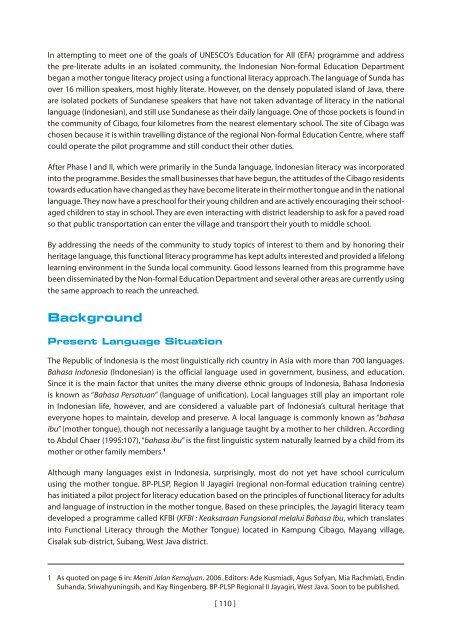Mother Tongue-based Literacy Programmes: Case Studies of Good ...
Mother Tongue-based Literacy Programmes: Case Studies of Good ...
Mother Tongue-based Literacy Programmes: Case Studies of Good ...
You also want an ePaper? Increase the reach of your titles
YUMPU automatically turns print PDFs into web optimized ePapers that Google loves.
In attempting to meet one <strong>of</strong> the goals <strong>of</strong> UNESCO’s Education for All (EFA) programme and addressthe pre-literate adults in an isolated community, the Indonesian Non-formal Education Departmentbegan a mother tongue literacy project using a functional literacy approach. The language <strong>of</strong> Sunda hasover 16 million speakers, most highly literate. However, on the densely populated island <strong>of</strong> Java, thereare isolated pockets <strong>of</strong> Sundanese speakers that have not taken advantage <strong>of</strong> literacy in the nationallanguage (Indonesian), and still use Sundanese as their daily language. One <strong>of</strong> those pockets is found inthe community <strong>of</strong> Cibago, four kilometres from the nearest elementary school. The site <strong>of</strong> Cibago waschosen because it is within travelling distance <strong>of</strong> the regional Non-formal Education Centre, where staffcould operate the pilot programme and still conduct their other duties.After Phase I and II, which were primarily in the Sunda language, Indonesian literacy was incorporatedinto the programme. Besides the small businesses that have begun, the attitudes <strong>of</strong> the Cibago residentstowards education have changed as they have become literate in their mother tongue and in the nationallanguage. They now have a preschool for their young children and are actively encouraging their schoolagedchildren to stay in school. They are even interacting with district leadership to ask for a paved roadso that public transportation can enter the village and transport their youth to middle school.By addressing the needs <strong>of</strong> the community to study topics <strong>of</strong> interest to them and by honoring theirheritage language, this functional literacy programme has kept adults interested and provided a lifelonglearning environment in the Sunda local community. <strong>Good</strong> lessons learned from this programme havebeen disseminated by the Non-formal Education Department and several other areas are currently usingthe same approach to reach the unreached.BackgroundPresent Language SituationThe Republic <strong>of</strong> Indonesia is the most linguistically rich country in Asia with more than 700 languages.Bahasa Indonesia (Indonesian) is the <strong>of</strong>ficial language used in government, business, and education.Since it is the main factor that unites the many diverse ethnic groups <strong>of</strong> Indonesia, Bahasa Indonesiais known as “Bahasa Persatuan” (language <strong>of</strong> unification). Local languages still play an important rolein Indonesian life, however, and are considered a valuable part <strong>of</strong> Indonesia’s cultural heritage thateveryone hopes to maintain, develop and preserve. A local language is commonly known as “bahasaibu” (mother tongue), though not necessarily a language taught by a mother to her children. Accordingto Abdul Chaer (1995:107), “bahasa ibu” is the first linguistic system naturally learned by a child from itsmother or other family members. 1Although many languages exist in Indonesia, surprisingly, most do not yet have school curriculumusing the mother tongue. BP-PLSP, Region II Jayagiri (regional non-formal education training centre)has initiated a pilot project for literacy education <strong>based</strong> on the principles <strong>of</strong> functional literacy for adultsand language <strong>of</strong> instruction in the mother tongue. Based on these principles, the Jayagiri literacy teamdeveloped a programme called KFBI (KFBI : Keaksaraan Fungsional melalui Bahasa Ibu, which translatesinto Functional <strong>Literacy</strong> through the <strong>Mother</strong> <strong>Tongue</strong>) located in Kampung Cibago, Mayang village,Cisalak sub-district, Subang, West Java district.1 As quoted on page 6 in: Meniti Jalan Kemajuan. 2006. Editors: Ade Kusmiadi, Agus S<strong>of</strong>yan, Mia Rachmiati, EndinSuhanda, Sriwahyuningsih, and Kay Ringenberg. BP-PLSP Regional II Jayagiri, West Java. Soon to be published.[ 110 ]

















